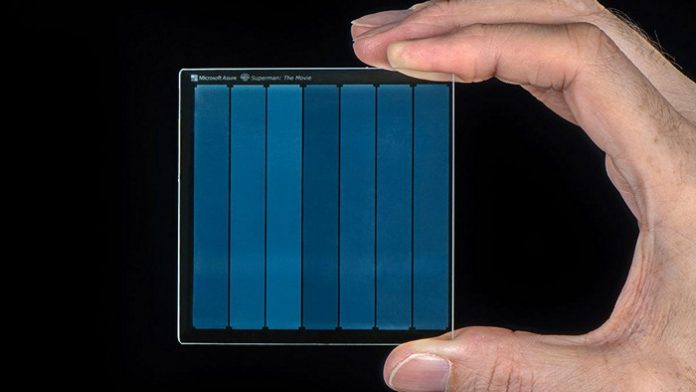The longevity of storage products have always been an issue for companies looking to store their archives for lengthy periods of time, without suffering deterioration in quality. Photos tend to fade over time, books rot, and even digital media such as CDs and hard drives are not the ideal medium to store our cherished digital memories or valuable data.
Microsoft has now created a proof of concept for storing data on glass. The software maker has teamed up with Warner Bros. to store an entire copy of the original 1978 Superman movie on a 2mm thin glass of 75 square mm. The concept storage is part of a big investment from Microsoft to develop storage tech built for the future of its Azure cloud platform.
“We built this entire system that’s essentially a new cold storage system,” revealed Microsoft CEO Satya Nadella onstage at the company’s Ignite conference last week. Microsoft is using regular quartz glass, and the company has boiled, baked, and scratched it to test its resilience. The research project, Project Silica, is designed for storing and preserving data.
Microsoft’s backing does mean that companies might take this new storage seriously. Warner Bros. got involved with Project Silica as a method to store digital assets permanently and provide durable backups. The entertainment company currently creates an archive copy by converting a digital copy back to analog film and splitting it into three color components to transfer each onto black-and-white film negatives that do not fade as fast as color film.
If Project Silica’s storage solution proves to be as cost-effective and as scalable as it could be, this is something we’d love to see adopted by other studios and our peers and other industries,” says Vicky Colf, Warner Bros. chief technology officer. “If it works for us, we firmly believe that this will be a benefit to anyone who wants to preserve and archive content.”
Microsoft is using infrared lasers to encode the data into ‘voxels’, a three-dimensional equivalent to the pixels that create images on screens. The data is stored within the glass, and machine learning algorithms can decode the patterns to read the data back. Hopefully, if Project Silica proves successful, we will all soon be storing our precious digital data on glass.

















